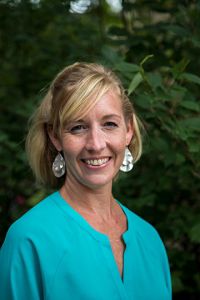The feminist message of an Iowa State lecturer aired on C-SPAN

Courtesy of Megan Gilbert/Iowa State University
Assistant professor Tracy Lucht’s lecture appeared on C-SPAN Jan. 7.
January 8, 2017
There may always be more room for progress, but the newsroom would look vastly different if it weren’t for the women who empowered themselves to be journalists during a time when journalism was strictly a man’s world.
These women who went to the extreme to break down gender barriers and make their way into the newsroom were the theme of Iowa State assistant professor Tracy Lucht’s lecture that appeared Saturday on C-SPAN’s “Lectures in American History.”
“Most of my research is about women in journalism, and that comes from my experience in newsrooms,” Lucht said. “Having worked in newsrooms right out of college and through graduate school, I found it really interesting that in our classes we have almost two-thirds female students and when you get into the newsrooms, the newsrooms don’t look like that.”
During her lecture, Lucht mentioned two different names that were given to the female reporters who were trying to find new genres and bring in new audiences. These were “stunt reporters” and “sob sisters.”
“Those two terms, stunt reporters and sob sisters, were actually used pejoratively to describe the kinds of content that women created,” Lucht said. “But they were able to use that content to get a foothold in the field and to draw attention to themselves and to issues that otherwise wouldn’t have gotten a lot of attention.”
Though these names were meant to bring on a bad connotation, publishers could not ignore the large numbers of people interested in these new topics.
One of the stunt journalists who Lucht spoke of was Nellie Bly, a woman who even during the late 1800s was able to pursue a career in journalism.
When given a story on an institution that housed the mentally ill, Bly went undercover as a patient and came back with stories of cruelty and mistreatment that led to reforms.
At the height of her career, Bly decided to try and beat Jules Verne’s fictitious novel, “Around the World in Eighty Days,” and while sending back writings during her trip, she completed the journey in 72 days.
Women like Bly pioneered investigative reporting and made way for more women to get their spot in the newsroom.
Today, about 36 percent of reporters are women. This number has increased slower than expected since the 1930s, when that number was 25 percent.
Lucht explained that the majority of the people taking journalism classes in college are women, but this reverses once leaving college and moving on to professional publications.
“We have yet to achieve gender parity in journalism,” Lucht said. “Women make up about two-thirds of the student enrollment in journalism and mass communication programs around the country, yet still do not have equitable representation in the field — especially in upper-level positions.”
Through her research, Lucht found that it is a combination of things. For one, the weight of staying home and raising a family today still falls more heavily on women.
There is also a pay gap between men and women in journalism, Lucht said, but another factor could be the low income alone that discourages women from the field.
“The newsrooms still they came out of a masculine type of tradition, and I think there’s still some of that culture that exists,” Lucht said. “And sometimes women don’t feel they fit as easily into that culture.”
Another area in journalism that lacks women is editing. Lucht said women make up almost 40 percent of entry-level jobs in journalism, but this percentage decreases when looking at higher positions.
Much of the interest that Lucht has when researching these topics comes from her own experiences working in newsrooms right out of college.
“Looking back on it, I did have some experiences that I wasn’t prepared for and I don’t think it was necessarily the fault of any of my professors,” Lucht said. “I didn’t really have the vocabulary for understanding those experiences at the time.”
Lucht recalled being hit on by sources and not knowing how to react. She said people advised her to encourage the source in order to get a better story, which felt completely unethical to her.
“I learned a lot about the ideals of journalism and the ethics of journalism and sometimes I didn’t always see those carried out in the real world, and that was surprising to me,” Lucht said.
Despite her own experience, Lucht said that after talking with women who were a part of the journalism industry during the ’50s, ’60s and ’70s, she truly realized how far the world has come when it comes to gender equality.
“There’s always progress to be made, but when you hear these women’s stories about things that happened to them, questions they were asked during their job interviews,” Lucht said.
These women were asked if they were on birth control and if they planned to get pregnant and start a family, questions that would have implication if asked in an interview today.
Going into the airing of her lecture, Lucht was unsure whether she would watch it out of a hatred of her voice that is common among many.
“I’ll probably have to do it with a glass of wine in my hand,” Lucht said. “I thought about proposing a drinking game for every time I say, ‘you know’ or ‘um.’”
As for now, she is glad that the stories of these women have been heard by many more than those in her classes, and that her message has gone far outside the city limits of Ames.






